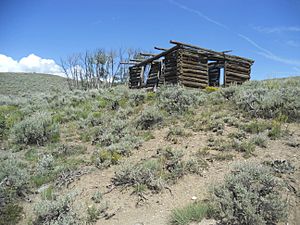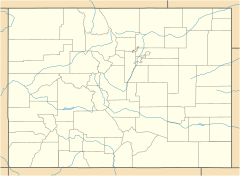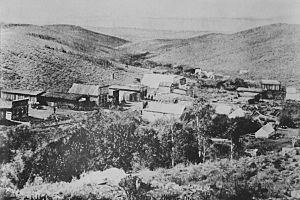Vulcan, Colorado facts for kids
Quick facts for kids
Vulcan
|
|
|---|---|

Abandoned building in Vulcan, August 2017.
|
|
| Country | United States |
| State | Colorado |
| County | Gunnison |
| Elevation | 8,924 ft (2,720 m) |
| GNIS feature ID | 188360 |
Vulcan is a ghost town in Gunnison County, Colorado, USA. It's about 15 miles (24 km) southwest of the city of Gunnison. Vulcan started as a mining camp in 1894 and was empty within 30 years.
Contents
The Story of Vulcan
In 1894, people looking for gold found it in the hills of southern Gunnison County. News spread fast! Within a year, several mines were digging for gold. These mines were along a spot called the Vulcan vein.
The mining camp of Vulcan grew very quickly. By the summer of 1895, about 500 people lived there. In March 1896, the town even got its own newspaper, the Vulcan Enterprise.
Challenges in Vulcan
The mines along the Vulcan vein produced a lot of gold. The Good Hope, Mammoth Chimney, and Vulcan mines shipped out the most ore. But life in Vulcan was not always easy.
There were arguments between workers and mine owners. Also, the mine owners sometimes sued each other. The rocks had a lot of sulfur, which caused problems. Big fires also destroyed parts of the town. After just a few years, the mines started to run out of gold. By 1906, almost all gold, silver, and copper mining had stopped.
Sulfur and Copper Mining
Luckily, there was also sulfur in the area that could be sold. This kept Vulcan going a bit longer. From 1906, sulfur was mined and shipped. But a huge fire in 1910 stopped these operations completely.
Vulcan saw one more burst of activity. In 1916, people started mining and melting copper again. But this didn't last long. By 1919, these operations also stopped. By 1920, only two people lived in Vulcan. Today, just a few old, broken buildings remain.
The Gunnison Gold Belt
Vulcan was the most successful mining town in the Gunnison Gold Belt. This gold-rich area stretches over 25 miles (40 km) across southern Gunnison County and a nearby county called Saguache County. Many gold discoveries led to mining and the creation of short-lived mining camps all along this belt.
Other Mining Camps
Other camps included Camp Willard (started in 1880), Cochetopa (1880), Dubois (1892), Spencer (1893), Midway (1894), Iris (1894), Chance (1894), Taliafaro (1895), and Sillsville (1903).
These towns grew fast after gold was found. Hundreds of people would move in within months. But they were often abandoned just as quickly. They usually had saloons, places to stay, and general stores. Many had post offices, and some even had schools. The buildings were a mix of wood and tents. Because of this, not many structures lasted. All these camps are now abandoned. Time has erased most signs of their busy past.
 | Selma Burke |
 | Pauline Powell Burns |
 | Frederick J. Brown |
 | Robert Blackburn |




